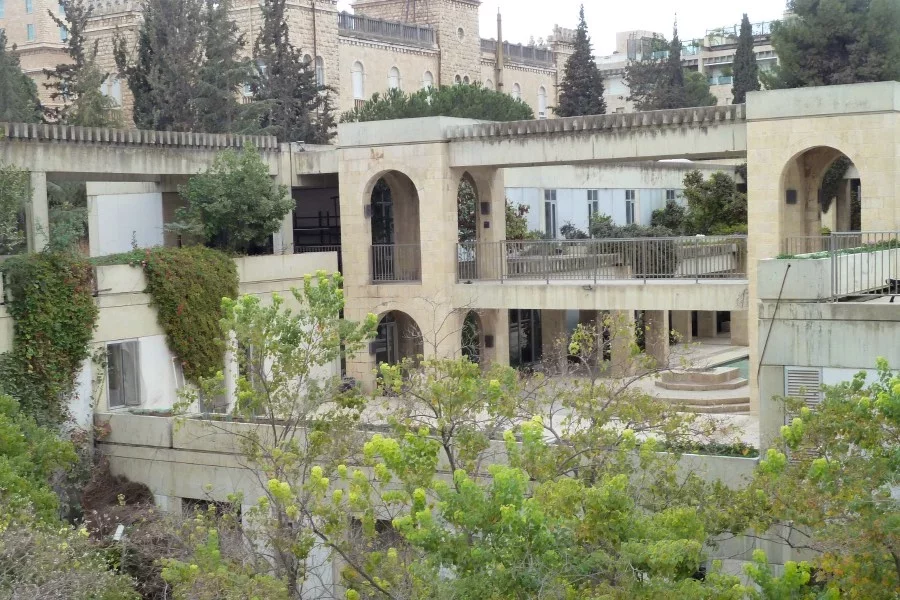Spencer Mandell: Erev Rosh Hashanah Sermon 5786

Freedom, Virtue, and the Man Named Peace
Spencer Mandell, Rabbinic Intern
When I left Cincinnati to begin Rabbinical School, I spent my first year of rabbinical studies at the Hebrew Union College’s campus in Jerusalem (pictured above).
I still remember walking into that campus’s sanctuary for the first time. The walls were built of great blocks of Jerusalem stone, solid and glowing in the Holy City’s morning light.
Something about these great stones seemed ancient and eternal, as though generations of prayer had seeped into them. As I prayed there, in Jerusalem. I felt free. Free to let my voice rise in song with my classmates, free to be part of something bigger than myself, free to belong. But even as my soul opened in prayer, I knew not every person around shared that same privilege.
Some of our Arab Israeli campus-mates, who were learning Hebrew for the first time in classrooms next to mine, carried struggles I could never fully understand. I remember back to my year in Israel, studying Torah, and the Palestinian groundskeeper whose family tended the gardens around our campus. His name in Arabic means peace. I am in awe of the calm, kind, and sweet Palestinian man whose family still tends the Hebrew Union College’s Jerusalem campus.
He is the very same kind-hearted man who managed the Jerusalem campus’s Beit Cafe, or coffee house when Rabbi Weitzman was a rabbinical student as well. Living, and studying in Jerusalem, I noticed a change in my prayers. The awareness that not everyone in Israeli society was treated equally pressed deeply on my soul.
This spiritual, and moral tension complicated my prayers.
My concern for all people’s human rights, and a need to be genuine with my prayers, taught me that freedom is NOT something that all of my neighbors know equally.
This awareness of inequality deepened, NOT diminished, my prayers - the pressing need for cultural, and religious equality in Israel made my Hebrew prayers feel all the more urgent.
Here in Albany, we don’t have walls made of Jerusalem stone. But we do have something just as strong. Our “stones” are the people sitting right here this evening. Our stones are the memories shared, the connections made, the generations of Jewish community that hold each other up.
Each of us is a building block in this holy community. Together we form a sanctuary that can hold our joys and our burdens, our laughter and our tears.
And tonight, on Rosh Hashanah, we bring all of it with us: our fears, our griefs, our uncertainties. And by virtue of being here at Temple we know; we are not alone. We could never be alone.
Our tradition doesn’t ask us to deny the weight we carry. It gives us tools to carry it differently. We declare them together in our liturgy:
.וּתְשׁוּבָה וּתְפִלָּה וּצְדָקָה מַעֲבִירִין אֶת רֹעַ הַגְּזֵרָה
Teshuvah, tefillah, and tzedakah temper the harshness of God’s decree.
Teshuvah - the courage to return. Tefillah - the prayer that opens our hearts. Tzedakah - the justice that binds us together. These are not abstract Hebrew ideals. They are daily practices. They are embodied by our holy community.
These Hebrew ideals are how we will transform fear into freedom, uncertainty into strength, grief into hope.
What prayer can we whisper? What song can we sing that will shift our hearts? What act of kindness, even as small as a phone call, can reshape the year ahead?
I remember back to my year in Israel, studying Torah, and singing proudly. But I also remember the Palestinian groundskeeper who quietly tended to the gardens, and fountains around our campus. His name in Arabic “Saleem.” Like our word “Shalom” means peace.
I always considered Saleem’s presence on our Jerusalem campus to be such a gift.
As we enter this new year, I invite you to wonder: How might your name mean peace in 5786? As we hear the Shofar’s ancient call during these holy days, let us do our best to remember. That our call is not to perfect the world all at once, but rather to build it one small stone, one small act, one small moment of return at a time.
For if apples and honey can teach us anything, it’s that even the smallest taste of hope can linger. Reminding us that joy is possible, even in uncertain times. So may this holy season bring us courage to change, comfort in community, and freedom to hope. May we all be written into a year of sweetness, strength, and peace.
Shanah Tovah u’Metukah.